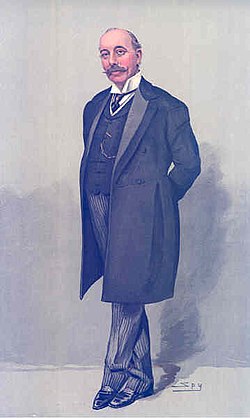Walter Roper Lawrence
Sir Walter Roper Lawrence, Bt Lua error: expandTemplate: template "post-nominals/UK" does not exist. | |
|---|---|
 | |
| Born | 9 February 1857 Moreton, Herefordshire, England |
| Died | 25 May 1940 (aged 83) |
| Occupation | Baronet, Author |
Notable work | The Valley of Kashmir (1895); The India we served (1929); |
| Spouse(s) | Lilian Lawrence |
| Parent(s) | George Lawrence and Catherine Lewis |
Sir Walter Roper Lawrence, 1st Baronet, Lua error: expandTemplate: template "post-nominals/UK" does not exist.[1] (9 February 1857 – 25 May 1940) was a member of the British Council-09[2] and an English author who served in the Indian Civil Service under the British in India and wrote travelogues based on his experiences of traveling around the Indian Subcontinent. Over the course of his wanderings, he developed a close affinity with the Indian and Kashmiri people, who figure prominently in his work. His best-known books are The Valley of Kashmir (1895) and The India we Served (1929).
Walter Roper Lawrence was born on 9 February 1857 at his home town Moreton-on-Lugg, Herefordshire, England, the son of George Lawrence and Catherine Lewis. He married Lilian Gertrude James on 18 March 1885.
Life in British India[edit]
Walter Roper Lawrence served in the Indian Civil Service Punjab (1879–1895).[3] He was appointed as the Settlement Commissioner for Jammu and Kashmir between 1889–1894, during the rule of Maharaja Pratap Singh.[4][5] While traveling in Kashmir, he recorded and produced a brief history on account of the geography, the culture of the people and the tyrannic Dogra rule over Kashmir. During his brief visit to Kashmir Valley, he authored, a first ever recorded, a complete encyclopaeda of Kashmir, The Valley of Kashmir.[citation needed]
In 1896, Lawrence left the Indian Civil Service. He was recalled by the Viceroy of India Lord Curzon to act as private secretary. Lawrence served this role during 1899–1903.[4]
He also accompanied the Prince and Princess of Wales to British India as Chief of the Staff.[4][6] In 1907, he served as a member of the Council of India. During the First World War, he worked on various missions for the Secretary of State for War Herbert Kitchener. In 1918 he was on the staff of the Indian Air Force with the rank of a Major General.[4]
In 1919, he served on the British Mission to Palestine and Syria.[4]
Works[edit]
As an author his major works are The Valley of Kashmir (1895) and The India we served (1929).
Lawrence was the first man who reported about the miseries faced by the people of Kashmir under the autocratic rule of Dogras.[citation needed] He wrote in his book The Valley of Kashmir:
The passage from Hazlitt‘s life of Napoleon, Bonaparte gives a fair idea of Kashmir before the settlement commenced: "The peasants were overworked, half-starved, treated with hard words and hard blows, subjected to unceasing exactions and every species of petty tyranny... While in the cities a number of unwholesome and useless professions, and a crowd of lazy menials, pampered the vices or administered to the pride and luxury of the great."[7][non-primary source needed]
Death[edit]
He died at the age of 83 on 25 May 1940. His grandson is Walter Lawrence.
See also[edit]
References[edit]
- ↑ "No. 34898". The London Gazette. 16 July 1940. p. 4398.
- ↑ Lundy, Darryl. "Sir Walter Roper Lawrence". thepeerage.com. Retrieved 22 June 2012.Template:Verify credibility
- ↑ "Sir Walter Lawrence designations". ampltd.co.uk. Retrieved 22 June 2012.
- ↑ 4.0 4.1 4.2 4.3 4.4 Dov Gavish (2005). A Survey of Palestine Under the British Mandate, 1920–1948. Routledge, 2005. p. 275–276. ISBN 9780714656519.
- ↑ "Walnut In Pandit Heritage – Rituals and Recipes". koausa.org. Retrieved 6 July 2012.
- ↑ Helene Petrovna Blavatsky (1929). Theosophical Quarterly Magazine, 1928 to 1929. Kessinger Publishing, 2003. p. 178–. ISBN 9780766152861. Retrieved 22 June 2012.
- ↑ Sir Walter Roper Lawrence (1895). The Valley of Kashmir. Asian Educational Services, 1895. p. 2–. ISBN 978-81-206-1630-1.
| Baronetage of the United Kingdom | ||
|---|---|---|
| New creation | Baronet (of Sloane Gardens) 1906–1940 |
Succeeded by Percy Lawrence |
- Articles with unsourced statements from December 2016
- 1857 births
- 1940 deaths
- Baronets in the Baronetage of the United Kingdom
- Companions of the Order of the Bath
- English travel writers
- Knights Grand Commander of the Order of the Indian Empire
- Knights Grand Cross of the Royal Victorian Order
- 19th-century English people
